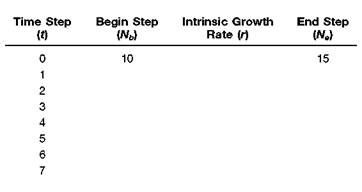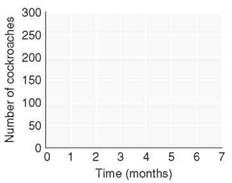
Environmental Science 12th Edition by William Cunningham,Mary Ann Cunningham
Edition 12ISBN: 978-0077431204
Environmental Science 12th Edition by William Cunningham,Mary Ann Cunningham
Edition 12ISBN: 978-0077431204 Exercise 5
Exponential growth occurs in a series of time steps-days, months, years, or generations. Imagine cockroaches in a room multiplying (or some other species, if you must). Picture a population of ten cockroaches that together produce enough young to increase at a rate of 150 percent per month. What is r for this population
To find out how this population grows, fill out the table shown. ( Hint: r remains constant.) Remember, for time step 0 (the first month), you begin with ten roaches, and end ( N e ) with a larger number that depends on r, the intrinsic rate of growth. The beginning of the second time step (1) starts with the number at the end of step 0. Round N to the nearest whole number. When you are done, graph the results. At the end of 7 months, how large did this population become What is the shape of the growth curve


To find out how this population grows, fill out the table shown. ( Hint: r remains constant.) Remember, for time step 0 (the first month), you begin with ten roaches, and end ( N e ) with a larger number that depends on r, the intrinsic rate of growth. The beginning of the second time step (1) starts with the number at the end of step 0. Round N to the nearest whole number. When you are done, graph the results. At the end of 7 months, how large did this population become What is the shape of the growth curve


Explanation
Environmental Science 12th Edition by William Cunningham,Mary Ann Cunningham
Why don’t you like this exercise?
Other Minimum 8 character and maximum 255 character
Character 255


